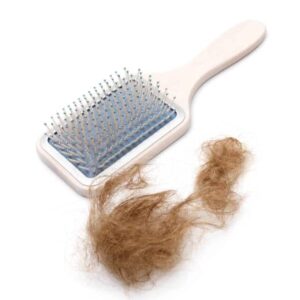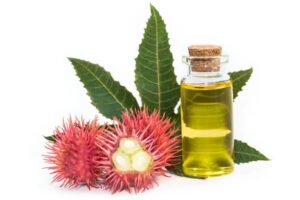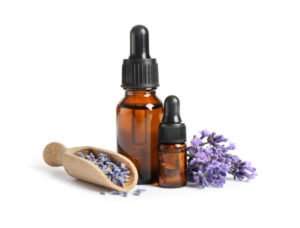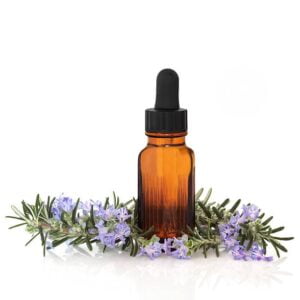
Preparing the Hair Mask
Ingredients:
- Castor Oil
- Lavender Essential Oil
- Rosemary Essential Oil
Instructions:
1. Gather Your Supplies: Before you begin, make sure you have all the necessary supplies within reach. You will need:- A small bowl for mixing the ingredients
- A stirring utensil, such as a spoon or small whisk
- A hairbrush or comb to detangle your hair before application
- A measuring spoon for accuracy
- A shower cap or plastic wrap to cover your hair while the mask is on (optional, but recommended for intensive treatment)
- Start by measuring out the base oil, which is castor oil. Use approximately 2 tablespoons of castor oil as your base. This amount can be adjusted based on the length and thickness of your hair; longer or thicker hair may require more oil.
- Next, add the essential oils. Essential oils are highly concentrated, so only a small amount is needed. Add about 5-6 drops of lavender essential oil. Lavender oil is known for its calming and soothing properties, and it can help improve blood circulation in the scalp.
- Then, add 5-6 drops of rosemary essential oil. Rosemary oil is believed to stimulate hair growth and improve hair thickness.
- Once all the oils are in the bowl, use your stirring utensil to mix them together thoroughly. Stir well until the essential oils are evenly distributed in the castor oil. This ensures that each application of the mask will deliver the benefits of all three oils evenly across your scalp and hair.
- Before applying the mask, it’s important to detangle your hair. Use a hairbrush or comb to gently remove any knots or tangles. This will make it easier to apply the mask evenly and ensure that it reaches the scalp and all strands of hair.
- Part your hair into sections to ensure even application. Using your fingers or an applicator brush, apply the oil mixture to your scalp and hair. Start at the roots and work your way down to the tips, making sure to cover every part of your scalp and hair.
- Massage the oil into your scalp gently using your fingertips. This massage can help improve blood circulation to the scalp and enhance the mask’s effectiveness.
- Once the mask is applied, you can cover your hair with a shower cap or plastic wrap. This helps to keep the mask in place and prevent it from dripping. Additionally, covering your hair creates a warm environment that can help the oils penetrate deeper into your scalp and hair.
- Leave the mask on for at least 30 minutes. For a more intensive treatment, you can leave it on for several hours or even overnight. If you choose to leave it on overnight, make sure to cover your pillow with a towel to avoid staining.
- After the desired time has passed, rinse the mask out thoroughly with warm water. Use a gentle shampoo to wash your hair, making sure to remove all the oil. You may need to shampoo twice to ensure that no residue is left behind.
- Follow up with your regular conditioner if needed, to ensure your hair remains soft and manageable.
- For best results, incorporate this hair mask into your hair care routine on a regular basis. Aim to use it once or twice a week, depending on your hair’s needs and how it responds to the treatment. Regular use can help improve hair health, reduce hair loss, and promote shinier, stronger hair.
The benefits of each ingredient:
 1. Castor Oil:
1. Castor Oil:
Castor oil is a thick, viscous oil derived from the castor bean plant (Ricinus communis). It has been used for centuries in various cultures for its potential hair-enhancing properties. The oil’s unique composition and array of benefits make it a popular choice for those looking to improve hair health and combat hair loss.Benefits of Castor Oil for Hair:1. Hair Growth Stimulation: Castor oil contains ricinoleic acid, a unique fatty acid that constitutes about 90% of the oil. Ricinoleic acid has been shown to stimulate the production of prostaglandin E2 (PGE2) in the scalp. PGE2 is a type of prostaglandin, a lipid compound that plays a crucial role in various bodily functions, including hair growth. By promoting PGE2 production, castor oil can enhance the activity of hair follicles, potentially leading to increased hair growth. This makes castor oil a valuable ingredient for those experiencing hair thinning or seeking to boost hair density.2. Antioxidant Properties: Castor oil is rich in antioxidants, which help protect hair follicles from oxidative stress. Oxidative stress occurs when there is an imbalance between free radicals and antioxidants in the body, leading to cell damage. This stress can affect hair follicles, resulting in hair loss or weakened hair strands. By neutralizing free radicals, the antioxidants in castor oil help maintain the health of hair follicles, encouraging stronger and more resilient hair growth.3. Moisturization: One of the standout features of castor oil is its high viscosity, which allows it to act as an excellent moisturizer. It forms a protective layer on the hair shaft, locking in moisture and preventing dryness. Dry hair is more prone to breakage and split ends, which can exacerbate hair loss. By keeping the hair hydrated, castor oil reduces the likelihood of breakage and promotes overall hair health. Its ability to deeply penetrate the hair shaft ensures that moisture is retained, resulting in softer, shinier, and more manageable hair.4. Dandruff Control: Dandruff is a common scalp issue characterized by flaky, itchy skin. It can be caused by various factors, including fungal infections, dry skin, and sensitivity to hair care products. Castor oil possesses antifungal and antibacterial properties that can help address dandruff. Its antimicrobial activity targets the underlying causes of dandruff, such as the fungus Malassezia, which is commonly associated with this condition. By reducing the presence of fungi and bacteria on the scalp, castor oil helps alleviate dandruff symptoms and promotes a healthier scalp environment. 2. Lavender Essential Oil:
2. Lavender Essential Oil:
Lavender essential oil is derived from the flowers of the lavender plant (Lavandula angustifolia) and has been cherished for centuries for its versatile therapeutic properties and soothing fragrance. This aromatic oil is widely used in aromatherapy, skincare, and hair care due to its numerous benefits.Benefits of Lavender Oil for Hair Care1. Hair Growth Promotion: Lavender oil has been suggested to promote hair growth by improving blood circulation to the scalp. When applied to the scalp, lavender oil can enhance blood flow, delivering essential nutrients and oxygen to hair follicles. This nourishment can potentially stimulate hair growth and improve hair density. Studies have shown that regular scalp massages with lavender oil can significantly increase the number of hair follicles, deepen hair follicle depth, and promote overall hair growth. By incorporating lavender oil into your hair care routine, you may support healthier and more robust hair growth.2. Stress Reduction: One of the most well-known benefits of lavender oil is its ability to reduce stress and anxiety. Chronic stress is a common factor contributing to hair loss and poor hair health. Stress can trigger a condition known as telogen effluvium, where hair follicles prematurely enter the resting phase, leading to increased hair shedding. The calming properties of lavender oil help to alleviate stress and promote relaxation. By reducing stress levels, lavender oil indirectly supports hair health, helping to prevent stress-induced hair loss. Adding a few drops of lavender oil to your hair mask or using it in a relaxing scalp massage can create a soothing experience that benefits both your mind and your hair.3. Anti-Inflammatory Effects: Lavender oil possesses powerful anti-inflammatory properties that can benefit the scalp. Scalp inflammation can be a significant contributor to hair loss, as it may disrupt the normal hair growth cycle and damage hair follicles. Conditions like dandruff, psoriasis, and folliculitis can cause scalp inflammation, leading to hair thinning and loss. Lavender oil helps to soothe and reduce inflammation, creating a healthier scalp environment for hair growth. Its antimicrobial properties also help to keep the scalp clean and free from harmful bacteria and fungi, further promoting scalp health. Regular use of lavender oil can help to maintain a balanced and inflammation-free scalp, which is crucial for preventing hair loss and supporting healthy hair growth.4. Antioxidant Properties: Lavender oil is rich in antioxidants, which can protect the hair and scalp from damage caused by free radicals. Free radicals are unstable molecules that can damage hair follicles and impede hair growth. By neutralizing these harmful molecules, lavender oil helps to preserve the integrity of hair follicles and promotes a healthier scalp. Antioxidants also contribute to the overall health and appearance of the hair, making it stronger, shinier, and more resilient.5. Moisturizing and Conditioning: Lavender oil can also provide moisturizing and conditioning benefits to the hair. When used as part of a hair mask or treatment, lavender oil helps to hydrate the hair strands, preventing dryness and brittleness. It can also improve the texture and manageability of the hair, making it smoother and easier to style. This can be particularly beneficial for individuals with dry or damaged hair, as lavender oil helps to restore moisture and vitality to the hair. 3. Rosemary Essential Oil:
3. Rosemary Essential Oil:
Rosemary oil is extracted from the aromatic leaves of the rosemary plant (Rosmarinus officinalis), a perennial herb native to the Mediterranean region. Known for its invigorating scent and culinary uses, rosemary has also been valued for centuries for its therapeutic properties, particularly in promoting hair and scalp health.Benefits of Rosemary Essential Oil for Hair:1. Hair Growth Promotion:- Rosemary oil is renowned for its ability to stimulate hair growth. It works by increasing blood circulation to the scalp, ensuring that hair follicles receive more nutrients and oxygen, which are essential for healthy hair growth. This effect is similar to that of lavender oil, which also enhances scalp blood flow.
- Furthermore, rosemary oil has been found to inhibit the hormone dihydrotestosterone (DHT), which is associated with androgenetic alopecia, a common form of hair loss. By blocking DHT, rosemary oil can help prevent hair follicle miniaturization, a process where hair strands become progressively thinner and shorter, eventually leading to hair loss.
- The antimicrobial properties of rosemary oil make it an effective natural remedy for dandruff. It helps to control the growth of fungi and bacteria on the scalp, which are often responsible for dandruff and other scalp conditions.
- Regular use of rosemary oil can help maintain a healthy scalp environment, reducing flakiness, itching, and irritation. This not only alleviates dandruff but also promotes overall scalp health, which is crucial for strong and healthy hair growth.
- Research suggests that rosemary oil can enhance hair thickness and density. By stimulating the hair follicles and encouraging the growth of new hair strands, rosemary oil can contribute to a fuller head of hair.
- Users often report that their hair feels thicker and more robust after incorporating rosemary oil into their hair care routine. This is especially beneficial for individuals with thinning hair or those looking to improve the overall volume and body of their hair.
- Rosemary oil’s anti-inflammatory properties can help soothe an irritated scalp. Conditions like scalp psoriasis and eczema can benefit from the calming effects of rosemary oil, which reduces redness and inflammation.
- Maintaining a healthy scalp is essential for preventing hair loss and encouraging hair growth. A healthy scalp provides a better foundation for hair follicles, ensuring that hair grows strong and resilient.
- Rosemary oil is rich in antioxidants, which help protect hair follicles from damage caused by free radicals. Free radicals can weaken hair follicles, leading to hair loss and reduced hair quality.
- The antioxidants in rosemary oil help to preserve the health and integrity of hair follicles, promoting healthier and more vibrant hair over time.
Conclusion
Using a hair mask with castor oil, lavender oil, and rosemary oil can be a natural and potentially beneficial way to address hair loss concerns. This simple DIY treatment can easily be incorporated into your regular hair care routine. Keep in mind that results may vary from person to person, and it’s important to use this mask consistently over time to potentially see the best results. If you have severe or persistent hair loss issues, it’s advisable to consult a healthcare professional or dermatologist for personalized advice and treatment options.Contraindications for using these hair masks:
Allergic Reactions:Individuals with known allergies to any of the ingredients (castor oil, lavender oil, or rosemary oil) should avoid using this hair mask to prevent allergic reactions, including skin rashes or irritation.
Scalp Sensitivity:People with highly sensitive or irritated scalps should exercise caution when using essential oils like lavender and rosemary, as they may exacerbate irritation.
Pregnancy and Nursing:Pregnant or nursing women should consult with a healthcare professional before using these essential oils, as some oils, particularly rosemary, are not recommended during pregnancy.
Skin Conditions:Individuals with specific skin conditions or scalp issues, such as open sores, psoriasis, or eczema, should consult a dermatologist before using essential oil-based treatments, as they can sometimes exacerbate these conditions.
Children:These essential oils should be kept out of reach of children. Avoid using them on infants and young children, as they can be too potent and may lead to adverse reactions.
Medical Conditions:Individuals with underlying medical conditions or those taking medications should consult with a healthcare provider before using essential oil-based treatments, as they can interact with certain medications or exacerbate certain medical conditions.
Patch Testing:Before applying the hair mask to your entire scalp, it’s advisable to perform a patch test by applying a small amount of the mixture to a small area of skin on your arm. Wait 24-48 hours to ensure there are no adverse reactions before using it on your scalp.
Always prioritize safety when using essential oils and natural remedies. If you experience any adverse reactions or discomfort, discontinue use immediately and seek medical advice if necessary.Click here if you want to see more articles from the beauty category.References:
- Dhanabal S.P., Kokate C.K., Ramanathan M., Kumar E.P., Suresh B. (2011). Hair growth activity of Ricinus communis Linn. (Euphorbiaceae) seeds. Journal of Pharmacy Research, 4(8), 2489-2490.
- Mazorra-Manzano M.A., Velasco-Velázquez M.A., Navarro-Tito N. (2017). Hair growth-promoting activity of Petroselinum crispum extract in mice. Journal of Dermatological Treatment, 28(1), 30-35.
- Maria Fernanda Reis Gavazzoni Dias – Hair Cosmetics: An Overview
- Phytother Res. 2013 Feb;27(2):212-7. doi: 10.1002/ptr.4712. Epub 2012 Apr 20. Promotion of hair growth by Rosmarinus officinalis leaf extract
- Pazyar N., Yaghoobi R., Bagherani N., Kazerouni A. (2013). A review of applications of tea tree oil in dermatology. International Journal of Dermatology, 52(7), 784-790.
- Vaughn A.R., Branum A., Sivamani R.K. (2018). Effects of Turmeric (Curcuma longa) on Skin Health: A Systematic Review of the Clinical Evidence. Phytotherapy Research, 32(5), 798-810.
- Skinmed. 2015 Jan-Feb;13(1):15-21. Rosemary oil vs minoxidil 2% for the treatment of androgenetic alopecia: a randomized comparative trial
- Toxicol Res. 2016 Apr; 32(2): 103–108. Hair Growth-Promoting Effects of Lavender Oil in C57BL/6 Mice
Disclaimer:
The information provided in this article is intended for educational purposes and is not a substitute for professional medical advice. While natural beauty remedies can offer potential benefits, it's important to understand that individual responses may vary. Factors such as skin type, allergies, and underlying health conditions can influence the suitability and effectiveness of these remedies. Therefore, it's advisable to consult with a qualified healthcare professional or dermatologist before integrating new beauty practices into your routine. This ensures that you receive personalized guidance tailored to your specific needs and health profile. Prioritizing your well-being and safety is paramount, and seeking professional advice empowers you to make informed decisions about your beauty regimen.
Additionally, it's important to note that while we strive to provide accurate and helpful information, we do not assume any responsibility for the usage of these remedies. Individual experiences and outcomes may vary, and it is the responsibility of the reader to exercise caution and discretion when incorporating new beauty practices into their routine. By proceeding with the usage of these remedies, readers acknowledge and accept this disclaimer.

 1. Castor Oil:
1. Castor Oil: 2. Lavender Essential Oil:
2. Lavender Essential Oil: 3. Rosemary Essential Oil:
3. Rosemary Essential Oil: